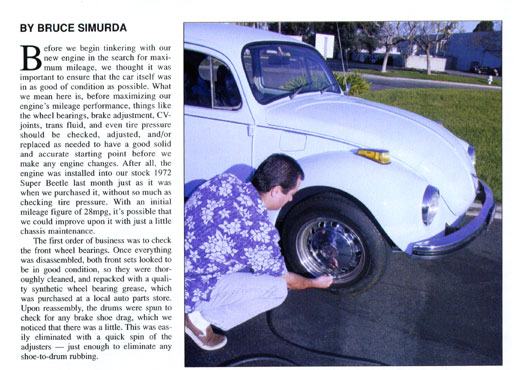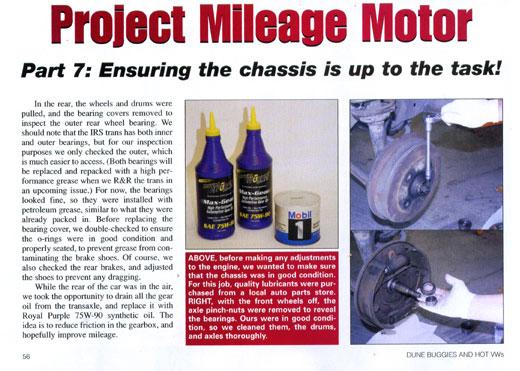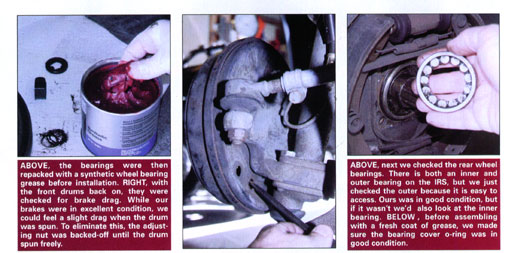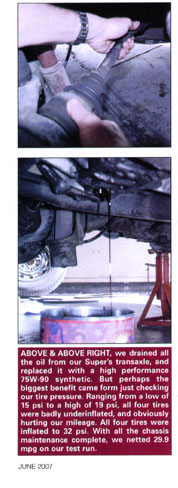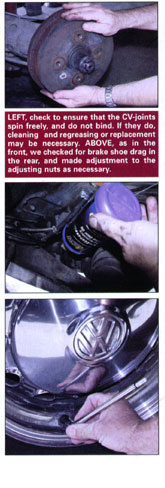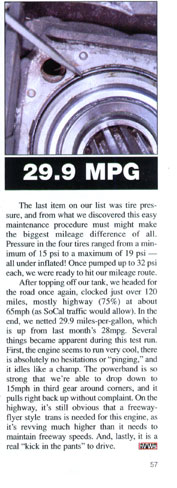|
Hot VWs - June 2007 - Project Mileage Motor - Part 7 Ensuring the chassis is up to the task!
Project
Mileage Motor BY BRUCE SIMURDA Before we begin tinkering with out new engine in the search for maximum mileage, we thought it was important to ensure that the car itself was in as good of condition as possible. What we mean here is, befor maximizing our engine's mileage performance, things like the wheel bearings, brake adjustment, CV-joints, trans fluid, and even tire pressure should be checked, adjusted, and/or replaced as needed to have a good solid and accurate starting point before we make any engine changes. After all, the engine was installed into our stock 1972 Super Beetle last month just as it was when we purchased it, without so much as checking tire pressure. With an initial mileage figure of 28mpg, it's possible that we could improve upon it with just a little chassis maintenance. The first order of business was to check the front wheel bearings. Once everything was disassembled, both front sets looked to be in good condition, so they were thoroughly cleaned, and repacked with a quality synthetic wheel bearing grease, which was purchased at a local auto parts store. Upon reassembly, the drums were spun to check for any brake shoe drag, which we noticed that was a little. This was easily eliminated with a quick spin of the adjusters - just enough to eliminate any shoe-to-drum rubbing. In the rear, the wheels and drums were pulled, and the bearing covers removed to inspect the outer rear wheel bearing. We should note that the IRS trans has both inner and outer bearings, but for our inspection purposes we only checked the outer, which is much easier to access. (Both bearings will be replaced and repacked with a high performance grease when we R&R the trans in an upcoming issue.) For now, the bearings looked fine, so they were installed with petroleum grease, similiar to what they were already packed in. Before replacing the bearing cover, we double-checked to ensure the o-rings were in good condition and properly sealed, to prevent grease from contaminating the brake shoes. Of course, we also checked the rear brakes, and adjusted the shoes to prevent any dragging. While the rear of the car was in the air, we took the opportunity to drain all the gear oil from the transaxle, and replace it with Royal Purple 75W-90 synthetic oil. The idea is to reduce friction in the gearbox, and hopefully improve mileage. The last item on our list was tire pressure, and from what we discoverd this easy maintenance procedure just might make the biggest mileage difference of all. Pressure in the four tires ranged from a minimum of 15 psi to a maximum of 19 psi - all under inflated!! Once pumped up to 32 psi each, we were ready to hit our mileage route. After topping off our tank, we headed for the road once again, clocked just over 120 miles, mostly highway (75%) at about 65mph (as SoCal traffic would allow). In the end, we netted around 29.9 miles-per-gallon, which is up from last month's 28mpg. Several things became apparent during this test run. First, the engine seems to run very cool, there is absolutely no hesitations or "pinging", and it idles like a champ. The powerband is so strong that we're able to drop down to a 15mph in third gear around corners, and it pulls right back up without complaint. On the highway, it's still obvious that a freeway-flyer style trans is needed for this engine, as it's revving much high than it needs to maintain freeway speeds. And, lastly, it is a real "kick in the pants" to drive. |
||||||||
